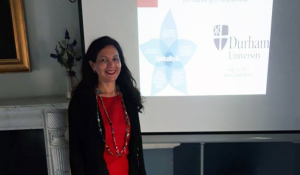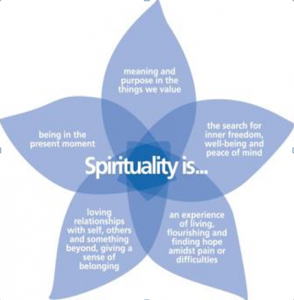 Spirituality is an “art/discipline/topic” within the National Health Service in UK. And it is worth of a dedicated congress which takes places yearly at the Durham University and related to National Health Service Foundation Trust. We don’t have anything similar in Italy, there is no official institution on Spirituality in case of Mental and Physical impairment by our national health service and I would add most of private health care services . Spirituality is left over to the entrepreneurship of single individuals, patients’ association, hospices, but what for me sounds more dangerous it is left to the wing of complementary medicine, very far from the current clinical settings and daily practice.
Spirituality is an “art/discipline/topic” within the National Health Service in UK. And it is worth of a dedicated congress which takes places yearly at the Durham University and related to National Health Service Foundation Trust. We don’t have anything similar in Italy, there is no official institution on Spirituality in case of Mental and Physical impairment by our national health service and I would add most of private health care services . Spirituality is left over to the entrepreneurship of single individuals, patients’ association, hospices, but what for me sounds more dangerous it is left to the wing of complementary medicine, very far from the current clinical settings and daily practice.
However, the need to spirituality in clinical setting is fundamental: we finally move beyond the bio-psycho social model to embrace the spiritual, bio, psycho social model. Some years ago the EORTC (European research on cancer and treatment) came up with a questionnaire on spirituality. It failed. Why? I think it was in the structure itself; there was a question with a rating scale ranging from 1 to 5 which was asking to patients “How much do you believe in a supreme force”? Well, this is not the right kind of question to investigating spirituality.
What is spirituality? Reverend Colin Jay, the main organizer of the conference sets the scene: spirituality belongs to invisible things? In business English we could say, it’s an intangible asset. Words might be redundant or not adequate to explain, however narratives might be the key factors for endorsing spirituality.
In the mental health, spirituality is something not endorsed by religion to institution, as a girl who says “I’m sorry I don’t believe in God… but I love animals…”, this is a spiritual person.
It can refer to those invisible but real qualities which shape a person or community such as love, hope, peace, truth. In the NHS everything has to be evidence based, as well as in Italy: therefore, perhaps, spirituality is an invention for the 50 and 60 to bring religion in the hospital.
The flower of spirituality depicted above has not to be intended in a unique definition. The flower can be used at three level. At a first level, just showing it as a poster, it brings visibility to patients, carers, and people and it creates a common language, and it makes distinction with religion. The second level is that every petal raises possible question to provide own answer. And there is a third level is action: the flower is empty, so that everyone is able to fill in the five petals with the human being characteristics.
Now we move on to wellbeing and to mental health. What is mental health?
Mental Health according the World Health Organization, is the emotional and spiritual resilience which enables us to enjoy life and to survive pain, disappointment and sadness. It is a positive sense of wellbeing and an underlying belief in your own worth and in the dignity and worth of others. Why do we need mental health? We are all like bucket: and if the water, the stress, overflow… We are overwhelmed, and so we need holes to get rid of the bucket. How to do it? Through recovery, that is enabling people to live better and stay better. Personal recovery is not clinical recovery, it is focusing of what is important and meaningful.
We can help ourselves using the CHIME factors:
- Connectedness
- Hope
- Identity
- Meaning
- Empowerment
Psychotherapist Allison Parish says that “Recovery is another name of wellbeing”. Clinical recovery was in the past, the need to find a cure. There was and there is still a focus on diagnosis, the need of that diagnosis, to find the right treatment. However often, especially in mental services, it does not go with the way health provider fixes things. Personal recovery is beyond symptoms, it is a meaningful, and satisfying life, despite symptoms.
How do the population define positive health? Health care providers go for the physical, psychological and social, whereas patients speak about spirituality. Maslow pyramid is still there fundamentall, we all need acknowledgment and self fulfillment: loving and be loved. Ryan and Deci say that there are three innate needs: relatedness, autonomy and competence. On the opposite we find, Disconnection/ isolation/ Alienations, and this is what crushes the human spirit.
The key to connectedness: those who have the strongest sense of love and belonging they believe they are worthy of love… those who struggle to connect, they don’t believe they’re worthy of being loved and to love. Shame is seen as a fear of rejection /isolation. The causes of shame is: I’m not good enough, not attractive enough, not clever enough not strong enough, I feel inadequate. There is an impossible idea of perfection, since perfection is not here in this earth.
To get a personal sense of love and belonging starts with a personal sense of worthiness, “I am good enough” and this many times needs a coach for an empowerment. We have to find the courage to be imperfect and the confidence to be seen for what we are and we need kindness and compassion for ourselves and to accept ourselves: aware of our inner critics, need the courage to fail, need the courage to be rejected, need the courage to face hard time.
Dr. Parish keep on illustrating the two Survival strategies:
- Perfectionism: plastic surgery, cars, phones status, talking about success of kids…
- Avoidance: Alcohol, drug spending, compulsive exercise…
Feeling pain means that we are all humans and this is a good thin: if we don’t feel pain, we won’t connect…this pain opens to joy and to love. In mental health services, but also in most of clinical setting, there is a label: “you’re personally disordered”, and this creates a wall between the healthy people and the ill people: Berne would have said easily “I ’m okay – you’re not okay, and this creates a big difference between me and you…”.
Here, we end up with the cycle of shame- isolation- distress and survival strategies- stigma “I’m crazy”- there is something wrong in me- and again shame. What do service users want?
- To be listened
- To have experiences and feeling validated (taken seriously)
- To been as a person and not as a set of symptoms
- To be given hope
- To be given choice…
And this five factors are related to the CHIME factors….like in the case of a girl with schizophrenia the doctor says “don’t go to the university, your schizophrenia is permanent” or like in men with cancer “don’t do children, you will die soon”.
Our recovery values should be a constant belief that everyone has the potential to live a meaning full life, irrespective of symptoms and diagnosis; and this challenges the fundamental view of many clinician “we know best” and we know for you, especially based on EBM. As a consequence the patients will feel more vulnerable, because sharing power can feel scary.
We all working and helping in the health care service need to develop faith in the power of relationship: Listening, validating, accepting, having compassion, understating, having the courage to fail. Working on shared decision might be a strategy to engage ourselves in the right way with the patient.
Reverend June Boyce-Tillman says:
As far as the difference between religion and spirituality, the church has been considering illness as related to sins more that to connectedness: and now spirituality has to adjust this sin of the church and religion.
The event goes on with many interesting speeches and ends up with two main concept: the learning organization and intelligent kindness. Please, go back to see our interview with John Ballatt.
Personally I learnt a lot, I used the flower of spirituality for clustering and analysing our thousands stories. Please download the pdf of my presentation: Religion and Spirituality as coping factors for recovery in illness time.
As a final remark, I met many many nice people, multidisciplinary, physicians, managers of the NHS, nurses, psychologists, philosophers, priests and chaplains. And what I lov most, many clever, smart women priests… a dream for our Italian future.


